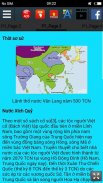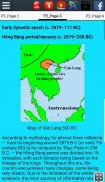










Lịch sử Việt Nam - History of Vietnam

Lịch sử Việt Nam - History of Vietnam介绍
The history of Vietnam can be traced back to around 4000 years ago. Archaeological findings from 1965, still under research, show the remains of two hominins closely related to Sinanthropus, dating as far back as the Middle Pleistocene era, roughly half a million years ago. Ancient Vietnam was home to some of the world's earliest civilizations and societies—making them one of the world's first people who practiced agriculture. The Red River valley formed a natural geographic and economic unit, bounded to the north and west by mountains and jungles, to the east by the sea and to the south by the Red River Delta. The need to have a single authority to prevent floods of the Red River, to cooperate in constructing hydraulic systems, trade exchange, and to fight invaders, led to the creation of the first Vietnamese states approximately 2879 BC. Another truly influential part of history in Vietnam occurred during the late Bronze Age, when the Đông Sơn culture dramatically advanced the civilization. Vietnam's peculiar geography made it a difficult country to attack, which is why Vietnam under the Hùng kings was for so long an independent and self-contained state. The Xích Tỵs and Qins were among the earliest foreign aggressors of Vietnam, but the ancient Vietnamese managed to regain control of the country soon after the invasions.
越南的历史可以追溯到约4000年前。从1965年的考古发现,尚在研究,表明密切相关的中国猿人2人族的遗迹,距今早在中更新世时代,大约50万年前。古代越南是拥有一些世界上最早的文明和社会,使他们成为世界上第一个谁练农业的人之一。红河谷形成了天然的地理和经济单位,在海边,由红河三角洲,南一定到北部和西部群山和丛林,到东部。需要有一个单一的机构,以防止红河洪水,在构建液压系统,贸易交流合作,打击侵略者,导致建立第一个国家越南大约2879 BC的。在越南历史的另一种真正有影响力的部分青铜时代晚期过程中发生,当Đông儿子文化前进显着文明。越南特有的地理位置使它成为困难国家的攻击,这就是为什么越南红国王下了这么久的独立和自足的状态。该XíchTYS和Qins是越南最早的外国侵略者之间,而是古代越南所管理的入侵后很快恢复对国家的控制。





















